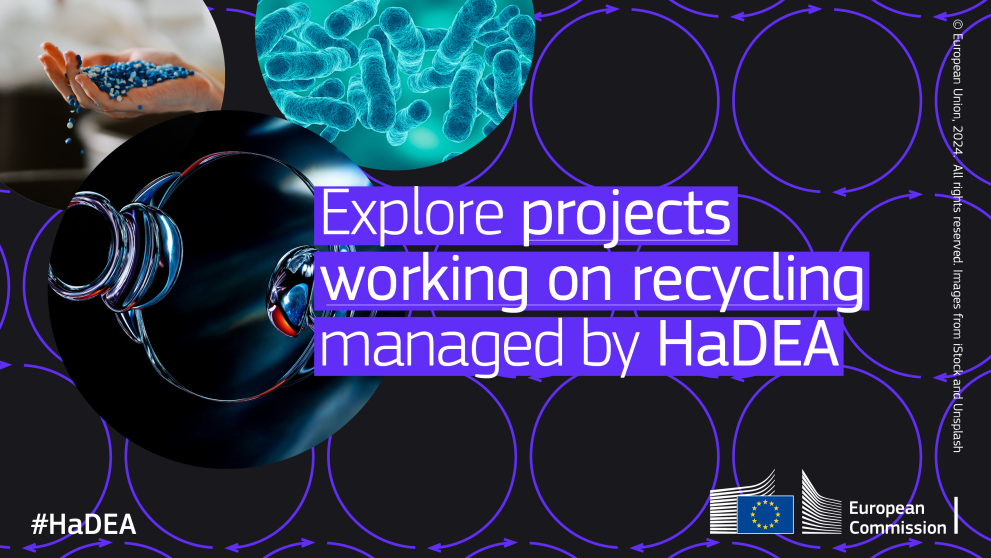
The Global Recycling Day aims to promote the use of recycled materials. It takes place every 18 March and it offers an opportunity to focus on recycling and its benefits.
Discover how EU-funded projects managed by HaDEA contribute to a circular economy, by making advancements in safely recovering, recycling and reusing end-of-life products and plastics:
- MIX-UP introduces a novel approach to the circularity of the plastic life cycle. The project is tackling the need to reuse and recycle conventional plastic, and finding new solutions to upcycle plastic mixtures into resistant and biodegradable plastics. First, a specifically defined enzyme cocktails breaks down mechanically pre-treated and unsorted mixed plastics into smaller components. Afterwards, dedicated microbial communities bio-convert these components into new elements that provide the building blocks for the synthesis of novel biopolymers. This way, MIX-UP generates a workflow that increases the recycling quota and adds value to poorly recycled plastics waste streams.
- BlackCycle is developing a full value chain that will exploit recycling of the end-of-life tyre feedstock to produce high-technical second-hand raw materials minimising any waste of resources. This project represents an advancement of the magnitude of recovery of end-of-life products. In addition to the environmental benefits, it contributes to the growth of the European tyre industry as the world leader of sustainable tyre production.
- PRIMUS secures the supply of waste plastics as feedstock, increasing the resilience of the EU's plastic value chains. By addressing one of the core challenges identified in the EU Circular Economy Action Plan – how to effectively and safely debrominate the hazardous substances used in plastics – the project contributes to circulating underutilised or non-recycled streams.
- ESTELLA proposes an innovative solution to improve the recyclability of thermosetting composites. It is examining various recycling techniques of any nature (chemical, biological and mechanical) to ensure that the newly synthesised thermosets are separated into their components in a safe and cost-efficient way. The new thermosets will be designed including fibres of renewable origin to the existing fossil-based epoxy formulations. The validation of the recyclable materials will be carried out through economically and environmentally efficient manufacture processes and the new composites will meet the demands of both construction and leisure/mobility.
- SURPASS supports the transition towards Safe, Sustainable and Recyclable by Design (SSRbD) polymeric materials. The project is developing SSRbD alternatives with no potentially hazardous additives through industrially relevant case-studies targeting three sectors: building, transport, and packaging. It is working to optimise reprocessing technologies adapted to the new SSRbD systems. SURPASS is also developing a score-based assessment to guide material designers, formulators, and recyclers, and integrate all data and associated methodologies into digital infrastructure.
Background
Horizon 2020 the EU’s multiannual funding programme between 2014 and 2020. H2020 provided Research and Innovation (R&I) funding for multi-national collaboration projects alongside individual researchers and SMEs via special funding instruments. Horizon 2020 is succeeded by Horizon Europe Programme, which will run until 2027.
Details
- Publication date
- 18 March 2024
- Author
- European Health and Digital Executive Agency
- Programme Sector
- Industry
- Programme
- Horizon Europe
- Horizon Europe Cluster 4: Industry
- Tags
- EUFunded
- Industrial research
- Innovation
